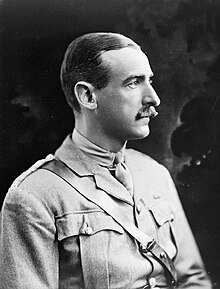Lieutenant-General Sir Adrian Paul Ghislain Carton de Wiart,[1] VC, KBE, CB, CMG, DSO (/də ˈwaɪ.ərt/;[2] 5 May 1880 – 5 June 1963) was an officer in the British Army. He was awarded the Victoria Cross, the highest military decoration awarded for valour "in the face of the enemy" in various Commonwealth countries.[3] He served in the Boer War, First World War, and Second World War. He was shot in the face, head, stomach, ankle, leg, hip, and ear; was blinded in his left eye; survived two plane crashes; tunnelled out of a prisoner-of-war camp; and tore off his own fingers when a doctor declined to amputate them. Describing his experiences in the First World War, he wrote, "Frankly, I had enjoyed the war."[4]
After returning home from service (including a period as a prisoner-of-war) in the Second World War, he was sent to China as Winston Churchill's personal representative. While en route he attended the Cairo Conference.
In his memoirs, Carton de Wiart wrote, "Governments may think and say as they like, but force cannot be eliminated, and it is the only real and unanswerable power. We are told that the pen is mightier than the sword, but I know which of these weapons I would choose."[5] Carton de Wiart was thought to be a model for the character of Brigadier Ben Ritchie-Hook in Evelyn Waugh's trilogy Sword of Honour.[6] The Oxford Dictionary of National Biography described him thus: "With his black eyepatch and empty sleeve, Carton de Wiart looked like an elegant pirate, and became a figure of legend."[7]
- ^ "No. 28074". The London Gazette. 1 November 1907. p. 7315.
- ^ Pointon, G. E. (1983). BBC Pronouncing Dictionary of British Names (2nd ed.). Oxford University Press. p. 46. ISBN 0-19-282745-6.
- ^ Crutchley, Peter (3 December 2018). "The unkillable soldier". BBC News. BBC.
- ^ Carton de Wiart 1950, p. 89.
- ^ Carton de Wiart 1950, p. 271.
- ^ The English author Christopher Sykes (1907–1986), Waugh's biographer, said in 1975 that he thought that the fire-eating officer in the Sword of Honour trilogy, Brigadier Ben Ritchie-Hook, "bears a very strong resemblance to" Lieutenant-General Sir Adrian Carton de Wiart VC, a friend of the author's father-in-law. Waugh was familiar with Carton de Wiart through a club to which he belonged.
- ^ Williams, ODNB
